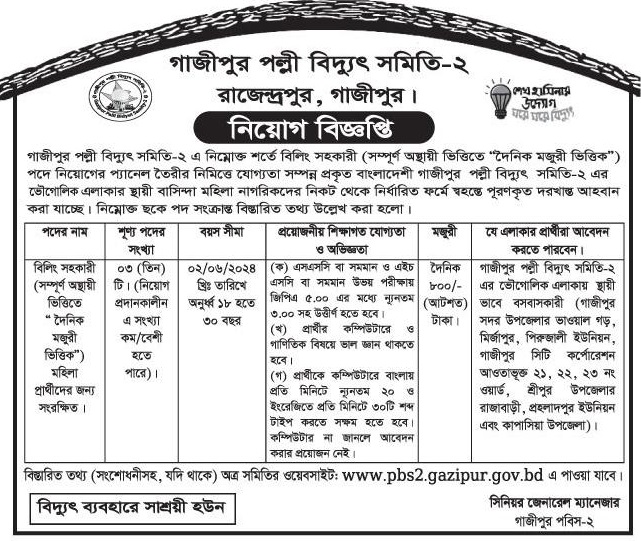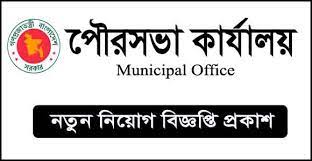Palli Vidyut Samiti-2, Gazipur
গাজীপুর পল্লী বিদ্যুৎ সমিতি-২, গাজীপুর
Job Category: Govt. Job
Job Source: দৈনিক যুগান্তর
Posted On: 15 May 2024
Application Deadline:15 Jun 2024

Welcome to our website bangladestodays.org. This is the best website online. Here you will get daily updates on all types of job news such as: E.g Job Vacancies in Public Sector, Private Sector, Corporate, Banking, NGO Jobs etc. You can select any type of job from the category option in the top menu of the website. You can apply for jobs directly on our website.There is a search option at the top of this website where you can search for jobs according to your requirements. If you have benefited even in the slightest from our website, then you can tell your friends, family and everyone else about this website. I hope you also benefit from this website. You can share this website post on Facebook, Instagram, Twitter or any other online platform if you want. Many people can benefit from your sharing.And if there is anything you want to know or understand, you can contact us by email on the contact page of this website. We will try our best to help you, thank you very much.
### Palli Vidyut Samiti: Powering Rural Transformation
#### Introduction
Palli Vidyut Samiti (PVS), often referred to as the Rural Electrification Cooperative, plays a crucial role in the socio-economic development of rural areas by providing reliable and affordable electricity. Originating from the concept of cooperative governance, PVS has been instrumental in bridging the urban-rural divide in terms of access to electricity, thereby fostering growth and improving the quality of life in rural communities.
#### Historical Context and Evolution
The origins of Palli Vidyut Samiti can be traced back to the broader rural electrification movements that began in the mid-20th century. These initiatives were aimed at addressing the stark disparity in electricity access between urban and rural areas. In many countries, governments recognized that private utilities were not incentivized to extend their services to low-density, low-income rural regions. Hence, the cooperative model, which emphasizes community ownership and control, emerged as a viable solution.
In countries like India, the concept of Palli Vidyut Samiti took shape under the framework of national rural electrification programs. The government provided the necessary infrastructure and initial funding, while local communities formed cooperatives to manage the distribution and maintenance of electricity services. This model ensured that the benefits of electrification reached the grassroots level and that the operations were aligned with local needs and priorities.
#### Structure and Governance
A typical Palli Vidyut Samiti is structured as a cooperative society. Its governance model is democratic, with members of the community having a say in the decision-making process. The key features of PVS governance include:
1. **Membership and Representation**: Any rural resident within the service area of the PVS can become a member by paying a nominal fee. Members elect a board of directors from among themselves, ensuring that the management is truly representative of the community.
2. **Board of Directors**: The board is responsible for major policy decisions, financial oversight, and strategic direction. Directors are usually elected for fixed terms, and the board typically includes subcommittees focused on specific areas such as finance, operations, and member services.
3. **Operational Management**: Day-to-day operations are managed by a professional team, including engineers, technicians, and administrative staff. This team is accountable to the board and, by extension, to the cooperative members.
4. **General Body Meetings**: Regular meetings are held where members can voice their concerns, suggest improvements, and vote on important issues. This ensures transparency and fosters a sense of ownership among the members.
#### Role in Rural Development
The impact of Palli Vidyut Samiti on rural development is multifaceted. Some of the key areas where PVS has made significant contributions include:
1. **Economic Growth**: Access to electricity has a direct correlation with economic activities. PVS enables the establishment of small and medium-sized enterprises, agro-processing units, and other businesses that rely on consistent power supply. This creates jobs and boosts local economies.
2. **Agricultural Productivity**: Electricity is crucial for modern agricultural practices. PVS provides power for irrigation pumps, cold storage facilities, and processing units, thereby enhancing agricultural productivity and reducing post-harvest losses.
3. **Education and Health**: Electrification has a profound impact on social services. Schools benefit from better lighting, access to digital learning tools, and extended study hours. Healthcare facilities can operate essential medical equipment, maintain vaccine storage, and improve overall service delivery.
4. **Quality of Life**: Beyond economic and social services, electricity improves the overall quality of life. Households enjoy better lighting, access to information through television and the internet, and the ability to use household appliances that reduce manual labor.
#### Challenges and Solutions
Despite its successes, Palli Vidyut Samiti faces several challenges:
1. **Financial Sustainability**: Ensuring financial viability is a constant challenge. PVS often operates in areas where consumers have limited ability to pay, and the cost of extending and maintaining the infrastructure can be high. Solutions include government subsidies, cross-subsidization from urban to rural areas, and innovative tariff structures that are both affordable for consumers and sustainable for the cooperative.
2. **Technical Issues**: Rural electrification networks often suffer from technical issues such as voltage fluctuations, power outages, and maintenance problems. Investing in modern infrastructure, regular maintenance, and capacity building for technical staff are crucial steps to address these issues.
3. **Member Participation**: Engaging members in the governance process can be challenging due to low literacy rates, lack of awareness, and socio-cultural barriers. PVS addresses this through regular community engagement, educational programs, and ensuring that communication channels are accessible and inclusive.
4. **Regulatory Environment**: Navigating the regulatory landscape can be complex, especially with evolving energy policies and regulations. PVS needs to stay abreast of policy changes, advocate for favorable regulations, and ensure compliance with legal requirements.
#### Future Prospects
The future of Palli Vidyut Samiti is closely tied to broader trends in the energy sector, including the shift towards renewable energy, smart grids, and decentralized power generation. Some promising directions include:
1. **Renewable Energy Integration**: Integrating renewable energy sources such as solar, wind, and biomass can reduce dependence on traditional grid electricity and enhance energy security. PVS can leverage local resources to generate clean energy and even feed surplus power back into the grid.
2. **Smart Grids and Technology**: Embracing smart grid technology can improve the efficiency and reliability of rural electrification. Smart meters, remote monitoring, and automated control systems can help in better load management, reducing losses, and providing real-time data for decision-making.
3. **Community Empowerment**: Strengthening the cooperative model by enhancing member participation and capacity building is crucial. PVS can invest in training programs, awareness campaigns, and creating platforms for community engagement to ensure that the cooperative remains vibrant and responsive to local needs.
4. **Policy Advocacy and Partnerships**: Collaborating with government agencies, non-governmental organizations, and private sector partners can bring additional resources, expertise, and innovation to PVS. Advocacy efforts can help shape policies that support rural electrification and address the unique challenges faced by cooperatives.
#### Conclusion
Palli Vidyut Samiti stands as a testament to the power of community-driven development and cooperative governance. By providing reliable and affordable electricity to rural areas, PVS not only fuels economic growth but also transforms lives and fosters sustainable development. Despite the challenges, the resilience and adaptability of the PVS model offer a blueprint for other regions grappling with similar issues. As the energy landscape evolves, PVS will continue to play a pivotal role in ensuring that the benefits of electrification are equitably shared, paving the way for a brighter and more inclusive future.

